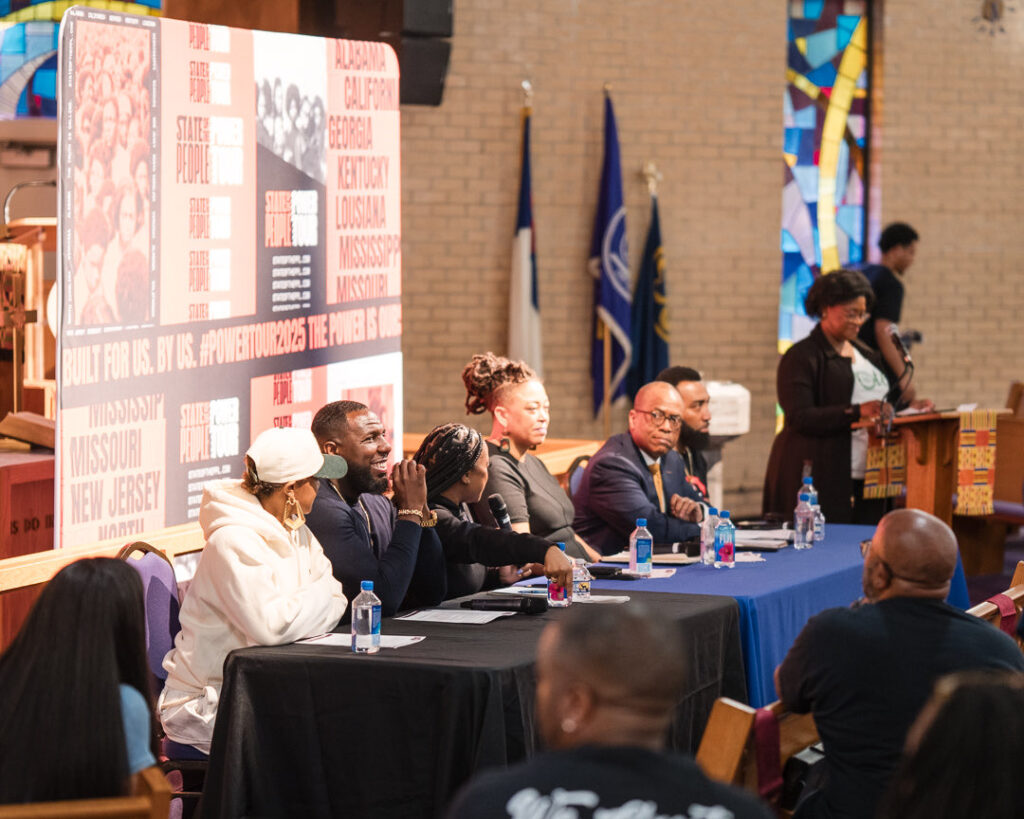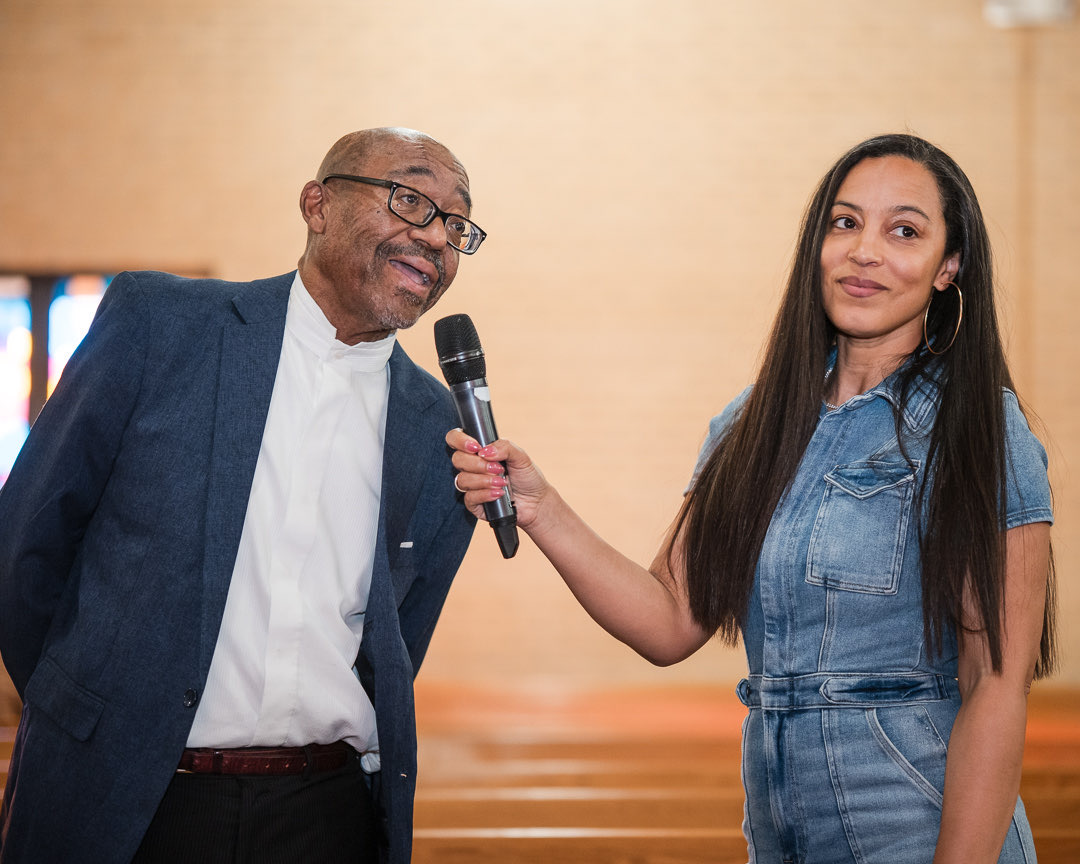Political commentator and social justice activist Angela Rye has embarked on the State of the People POWER Tour, a 10-city tour aiming to be a pillar of support for the Black community.
SOTP launched its digital footprint on January 15, the nationally recognized holiday honoring Dr. Martin Luther King Jr.’s impactful work. Since then, a 24-hour marathon with political and community leaders was held in response to the “distraction and disinformation” that would come from President Donald Trump’s unofficial State of the Union speech in March. Next on the organization’s agenda was its POWER tour initiative, a grassroots movement that kicked off on April 26. Its mission? To “rally, restore, and reimagine” possibilities for African Americans nationwide by mobilizing everyday citizens to advocate for change where they live.
Rye and the NAACP’s President and CEO, Derrick Johnson, spoke with Blavity to discuss the tour’s purpose and what’s happening at each stop. They also shared what happens when people come together to share experiences, educate each other and provide resources to organize and strategize.
Putting people over politics: Mobilizing and meeting the community’s needs
When discussing the organization’s sole focus, Rye clarified that SOTP’s POWER tour is about informing, collaborating and empowering Black communities to take proper action to address their needs.
“This tour, the State of the People Power Tour, is not about Donald Trump. It is not about what they do to us. It is about how we come together. It is about the more than 100 national partners that we have that are standing in coalition to meet the needs of our communities,” Rye told Blavity. “It is about the many times where people ask, ‘How are you doing?’ and never wait to hear the answer. It’s about the many times where we see a need but don’t seek to go out and meet it.”
“I just want to add that the tour itself is about putting people, not politics, in the center of the conversation and the realization that diverse groups and individuals can come to the table and collaborate, removing organizational identity and supremacy, and put people first. I think that is absolutely important,” Johnson added.

He also emphasized the urgency of collective action and community-centered dialogue in the face of harmful policy threats.
“There has to be an ongoing two-way dialogue. People are living in the reality of bad policy proposals and an administration seeking to implement policies that would take away benefits that they have paid for, taking away their Social Security, taking away veteran benefits, placing a level of fear around individuals who are willing to speak out,” Johnson said. “Our job in this tour is to give space so our folks can have a voice, so we can hear about what’s taking place.”
From town halls to tangible help: Meeting people where they are
The tour establishes a safe hub for Black Americans to express their truths and unmet needs.
“In order for us to have a real assessment of where we are and again, what needs we need to meet, we have to be very clear about it. So often, people see national leaders not in the community, not doing the things that they normally do. And so they think that the perception is that folks are out of touch. And in too many instances, folks are, in fact, out of touch,” Rye noted. “This is a way for us to come together, to go in spaces together, to tour together, to demonstrate that we know we are all we have. This tour is for us. It is by us. It is designed to meet needs first. It is designed to empower our folks.”
An example would be how the SOTP team met and learned the story of a teacher during their Atlanta stop. The educator is guiding the next generation while living in her car, which is unfortunate.
“That is the kind of thing that we want to say, ‘Not on our watch.’ We are too resourced. We have too many tools. We are too innovative for that to be the case,” Rye said. “Those are the kinds of things that we want to address on this tour because no matter who’s been in office, there are a lot of our folks who’ve been suffering no matter what.”

Each stop features a town hall forum and a workshop to ensure attendees have local support resources. Johnson shared the instance of discovering the work of Jasmine Crowe, the founder of Goodr, which focuses on ending food waste, feeding communities and fighting hunger.
“Let me say the brilliance that Angela brought to not only having the town hall conversation, but also, people are impacted every day,” Johnson shared. “And so what we have been able to do, and it was her vision, is to tap [into] what are the local resources that people should be aware of.”
He added, “I was really pleased to see the sister in Atlanta who has a grocery store for individuals who are suffering through food insecurity. Many people didn’t know she operates at the level she’s operating. And so, as opposed to going to a food pantry at a church, which for some people that’s an embarrassing experience, she’s created a new model.”
Black spending power fuels a new wave of resistance
As economic empowerment gains traction in the Black community, Johnson praised a growing wave of intentional spending and financial awareness, stating: “I am loving the energy that I’m seeing as people in our community become more conscious around their dollar discipline. Whether it is a selective buying campaign, whether it’s people looking at a consumer advisory panel of companies who care and invest in our community, therefore they receive reciprocity, or all out fast of a company. All of that energy is good energy because people are conscious.”
Rye quoted a sentence from MLK’s speech he gave in 1960 at Spelman College: “If you respect my dollar, you will also have to respect me as a person.” She shared this to underscore the power of economic agency in the fight for justice and dignity within the Black community.
“If you can’t see the importance of equity, you don’t get my dollar,” she said. “If you can’t see the importance of seeing my humanity, you don’t get my dollar. If you can’t see the importance of justice for all of us and you’re going to support, like, oppressive systems, you can’t get my dollar. And I think we need to be doing that across the board, even when it is difficult.”
The tour is reminiscent of the groundwork of those who fought the good fight during the civil rights movement.
“It is designed to tap into the resilience of our ancestors and to provide the necessary relief we need to continue to move forward,” Rye said. “So, telling is only one part of it. It is acting more than it is telling, right? I think it’s been too much time talking and not enough time moving, so I think that is like the crux of it. We want to listen more than we want to talk on this tour.”
The POWER tour hit the third city, Birmingham, over the weekend, following Atlanta, Durham and Raleigh, with seven more cities running into June. The conclusion will be in Baltimore.
Visit the State of the People Tour’s website to RSVP for the remaining tour stops below:
- New Orleans (May 8-9)
- Newark (May 13)
- Richmond (May 16-17)
- Detroit (May 21-22)
- Jackson (May 30-31)
- Louisville (June 2-3)
- Los Angeles (June 5-6)
The post Angela Rye And NAACP’s Derrick Johnson On Black Spending Power Fueling A New Wave Of Resistance appeared first on Blavity.

